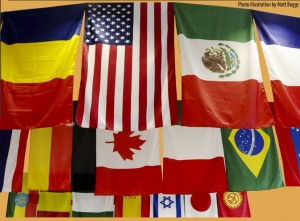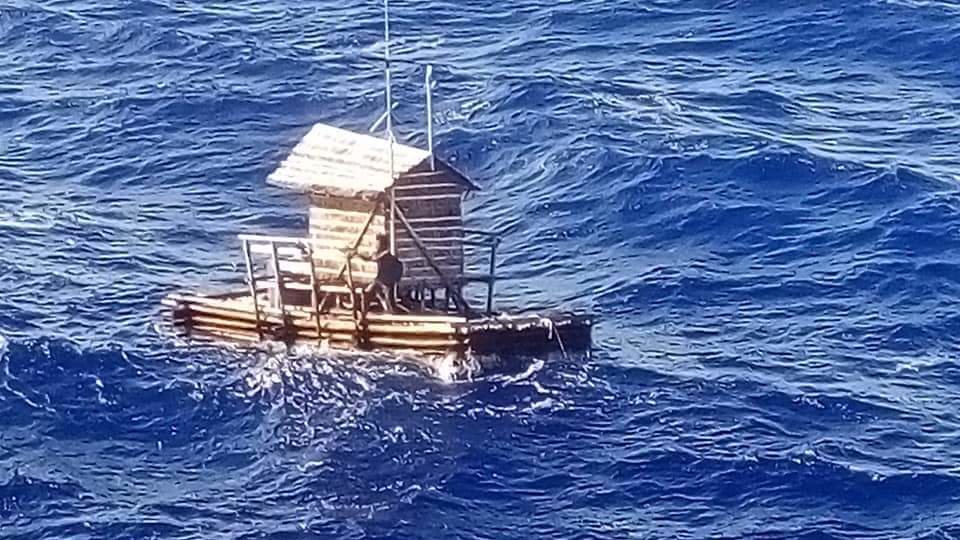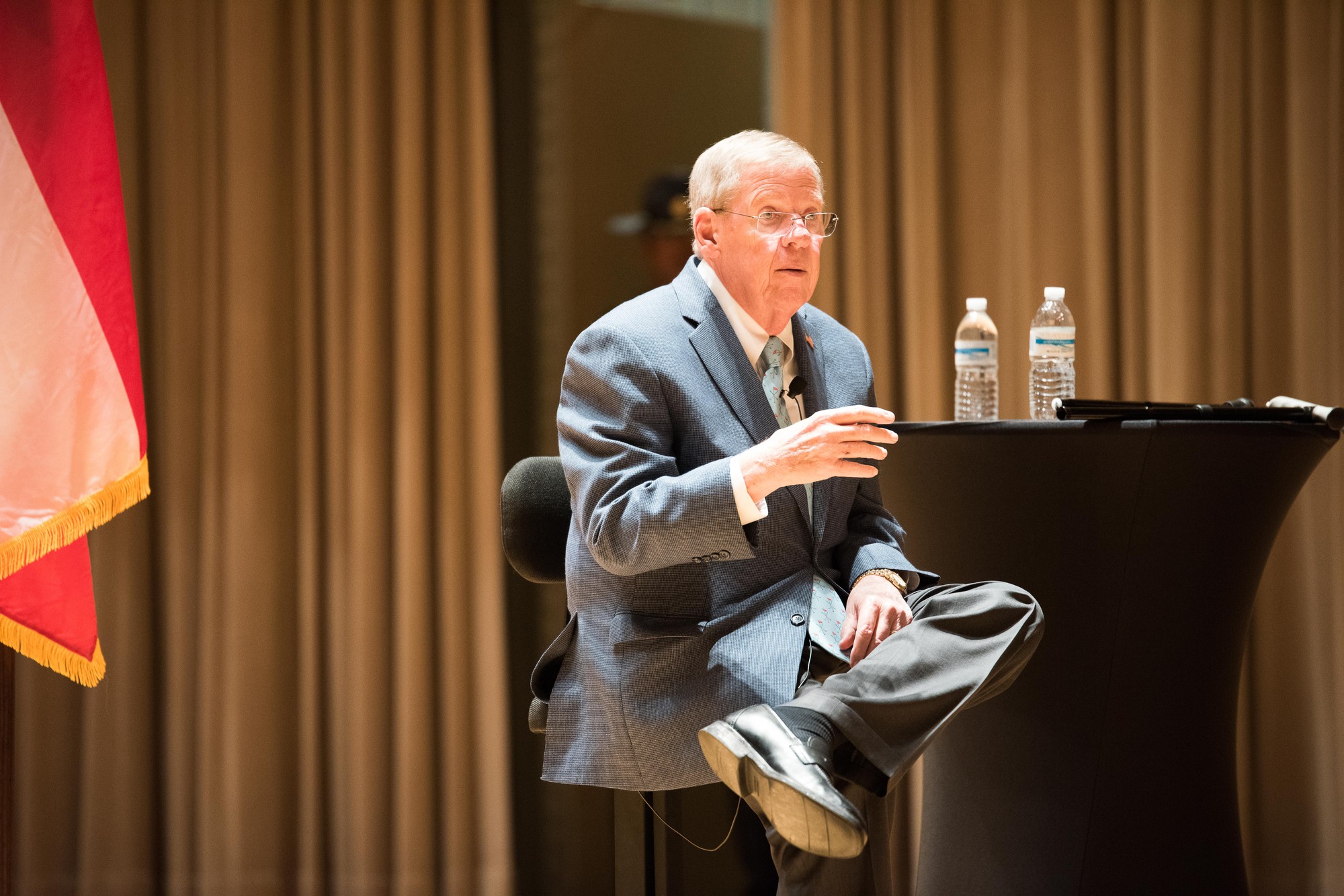By Sierra Hubbard, Staff Writer
Eleven Kennesaw State University students traveled to Washington, D.C. for the Twenty-Ninth Annual International Model NATO Conference on Feb. 13-16 and returned with several awards.
KSU has been participating in model simulations for years, including Model United Nations, but this marks only the second conference for Model NATO. Despite being newly established participants, though, the teams made quite an impression and far surpassed last year’s results. Remembering the one award won in 2013, these students were very proud to bring home five individual awards and one team award in February.
Dr. Stephen McKelvey is the faculty member over Model NATO. He teaches political science, particularly American Government and Global Security. He has been associated with simulation programs at KSU since 1988. He sponsored these for six years before spending some time away, but he returned to KSU in 2002. For nine years, McKelvey was the faculty adviser for Model U.N., and then he started Model NATO in the fall of 2012.
The international model is a simulation of basic NATO proceedings. According to the delegation handbook, it is designed “to highlight major military-security, political, economic, and social issues facing NATO countries and to demonstrate the need for effective diplomatic, economic, and military cooperative action in an unfolding crisis situation.” Schools from all over the United States, as well as from Canada, Britain, Belgium and other parts of Europe, come together representing specific nations within NATO and acting as delegates defending their policies. The students from Kennesaw were split into two teams: one team represented the Czech Republic and the other represented the Republic of Georgia, a partner country of NATO.
Breaking down even further, each country is split into individual committees that cover specific topics. “So we have students who not only represented the Czech Republic this year and Georgia,” McKelvey said, “but they become specialists on specific policy issues because, you know, defense policy is too broad, right?
“So you’ll have one committee, for example, that specializes just on nuclear questions, and another committee that will be working with training exercises and improvement of logistics and what the relationship should be with, say, Russia or Belarus.”
These students, then, spend eight months beforehand preparing for this conference, pouring over hundreds of articles and information on different policies. Many take the NATO Special Topics course in the fall, taught by McKelvey, and the team also meets weekly beginning in August or September.
After spending the first day sight-seeing around Washington, D.C., and visiting the Lincoln Memorial, Capitol Building, Jefferson Memorial and more, the teams went to their respective embassies and were given their briefings. During this time, the real government officials and delegates answer questions the students have and help them better understand the policies.
The Czech team met with the First Secretary to the Ambassador of the U.S. to the Czech Republic. Jeffrey Hardy, a senior majoring in international affairs, recalls the meeting with reverence. “He was just a really great Czech diplomat who had actually worked with NATO before, so he was able to brief us on exactly what the Czech Republic does,” Hardy said. “The experience was great because it was a very professional environment.”
Professor McKelvey saw the briefings as the highlight of the trip. “Before the briefing, my students were very knowledgeable about Czech policy,” McKelvey said, “but they had some specific questions for him, and he was able to give them not just what the Czech government has done but how the Czech government would actually express this opinion.
“So after talking with him, they not only knew about the Czech Republic, they genuinely felt like Czechs, so they were really proud.”
The team representing the Republic of Georgia was briefed by the Chief of Missions of the embassy, the man who is second-in-line behind the ambassador. Morgan Knowles, a junior and psychology major, saw the meeting as a validation that this conference was real.
“It wasn’t until we got to D.C. and we got to meet the Chief of Missions of the embassy that we really became Georgians,” Knowles said, “and you have this sense of pride for the country you’re representing, and you see them talking about the same things you’ve been reading about, and it comes to life.”
Sometimes the students spend so much time focused on studying these policies that they forget they are applied internationally. “Even though it’s a simulation that we’re doing, this is actually happening at a level that’s much greater than what we imagine.”
Ruth Forsythe, the Model NATO team captain, was also a member of the Georgia team. “We had been studying Georgia for months, and we thought we knew the policy very well, and we did and it showed when we were there,” Forsythe said. “He was impressed by the questions we were asking, and he could tell that we knew the policy.”
Forsythe, as captain, was in charge of setting up weekly meetings, learning roles of procedure, coordinating with Professor McKelvey, and representing Model NATO within Global Society, the umbrella organization at KSU.
After the briefings, the conference begins, and the committees all meet together and begin discussing different policies and try to get plans passed. All of the countries within NATO have varying ways of dealing with the common defense, nuclear weapon policies and more.
“These things have to be debated and agreed on by the different foreign ministers,” McKelvey said. “They come up with working papers that become resolutions and then these resolutions are transmitted to the North Atlantic Council.”
KSU students did very well at the conference, evidenced by the many awards the teams returned with. “When you hear Kennesaw State University called out six times,” McKelvey said, “you know, three individual awards for the Georgians, two individual awards for the Czechs, and one team award for the Czechs, you straighten your tie and you’re so proud that they did well.”
Forsythe and Hardy are two of the students who won individual awards. “I was really humbled,” Forsythe said, “because the way they give the individual awards is they have everyone in your committee vote on who they think did really well, so it’s your peers choosing who wins the awards.”
“It was really great to see Kennesaw stand out above the Citadels and Northeastern and all the bigger name schools there,” Hardy said.
Eddie Mienie, a senior majoring in international affairs, was on the Czech team and has never done a simulation before. “It was much better than I expected,” Mienie said. “I thought it would be extremely formal, and it was formal, but it was also very comfortable when I was there to interact with the other delegates and students.”
Mienie encourages other students to participate in Model NATO. “It’s the opportunity of a lifetime,” Mienie said. “You only have so many years at college; why not get the most out of it? And I think if I knew about this earlier, I would have done this all four years of my career as a student.”




